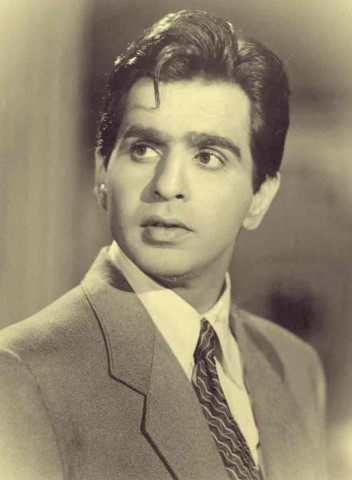The glorious legacy of Dilip Kumar
On Dilip Kumar's birthday, celebrities pay homage to the man known as Bollywood's 'Tragedy King'

On Google, you’ll find plenty of vintage images of Dilip Kumar, Dev Anand and Raj Kapoor - the ruling triumvirate from the golden era of Bollywood. In most, one can see their brotherhood.
But the images belie their intense screen rivalry. In one black and white photo, an impish Anand is digging into Kumar’s plate while in another, the he has his arm around him. In one image, Kumar is affectionately pulling his childhood friend Kapoor’s cheeks. There are also images of them playing cricket, reported The Indian Express.
But in nearly all of them, there is an unspoken acknowledgement of Kumar’s status as the Big Brother of this club. That shouldn’t come as a surprise to anyone. Bollywood’s original (Yousuf) Khan, the actor was the eldest among the three. Together, they formed the holy trinity of the 50s Hindi cinema and yet, it was Kumar alone who went on to develop the blueprint that all future Hindi film heroes would borrow.
Consider the 1950s. Kapoor had modelled himself on Charlie Chaplin. As the star of a young and independent nation, his cinema was seeped in socialistic ideology. Anand, on the other hand, was an urbane star, known for his Gregory Peck-Cary Grant sophistication and jovial acting. Meanwhile, Kumar stuck to serious and tragic, even weepy, roles and was a proponent of an understated, naturalistic style of acting. The Tragedy King, as Kumar came to be known, was unconsciously developing method acting.
In Bollywood, you cannot become a star if you don’t have a bit of Kumar in you. From Dharmendra and Amitabh Bachchan to Aamir Khan, Govinda and SRK, his influence can be felt in every generation that has come after him. An ardent admirer, Bachchan used to study the evergreen star’s performances. And Kumar’s 98th birthday this week, he said, “Dilip Kumar’s presence and dedication shall be documented as ‘before Dilip Kumar and after Dilip Kumar’.”
Celebrities wish The Tragedy King
To the one and only, who amazed and inspired the world by just being himself. Wishing the legendary @TheDilipKumar a Happy Birthday. I cherish & remember every time we’ve met in vivid detail & you have always loved me like your own. Love you tooo much.Have a good one Dilip Sahib. pic.twitter.com/XoaT2s7a8x
— Shah Rukh Khan (@iamsrk) December 11, 2020
When all the words in the world fail to describe a human being, an Actor, an Era,a Legend,an Institution and all the joy, light n sheer magic he brought on celluloid each time he enlightened it 💕💕💕
— Urmila Matondkar (@UrmilaMatondkar) December 11, 2020
Happy Birthday #DilipKumar saab #HappyBirthdayDilipKumar ❤️ pic.twitter.com/fWq5BZWjsZ
To my dearest Yusuf Khan Saheb / Shri. DIlip Kumar Ji @TheDilipKumar My salute to one of the greatest living Indian artistes in Cinema. Happy birthday sir and
— Kamal Haasan (@ikamalhaasan) December 11, 2020
I place my gratitude for setting a benchmark half a century ago, for today's artistes to follow. pic.twitter.com/qjz5yjbjFW
Happy birthday Yusuf Saab. You’re an institution by yourself. And, you’ve always been my steady source of inspiration over the years. Respects to you Sir today and always🌹 pic.twitter.com/7SrszBhBtw
— Ajay Devgn (@ajaydevgn) December 11, 2020
Happy birthday @TheDilipKumar saab 🎂 I wish you good health and a long life ahead. I feel fortunate remembering the times we spent together while shooting for #Izzatdar & #KanoonApnaApna. Sending you my best wishes. Take care 🙏❤️ pic.twitter.com/fOwWwkc6au
— Madhuri Dixit Nene (@MadhuriDixit) December 11, 2020
Dharmendra was so inspired by his matinee idol that he decided to leave his village in Punjab and rush to Bombay to become an actor. Years later, he would reflect poetically, “Dilip Kumar is that the brightest star whose shine I stole to light my desires.”
The Tragedy King may have unwittingly become an institution but the surprising fact is that he never wanted to act in the first place. He has called himself an “accidental” actor. Born as Yusuf Khan in Peshawar’s Qissa Khawana Bazaar, his father was a fruit merchant. Yusuf was educated in Nashik but ultimately the family relocated to Bombay.
Kumar’s father had no love lost for the “louche” film world. Imagine his trauma when Devika Rani of Bombay Talkies offered him a role. The studio even came up with screen names for him.
And so, Yusuf Khan became Dilip Kumar. Jugnu (1947) was his first major hit, followed by Shaheed, Mela and Andaz, promptly turning him into a superstar. But for a true appreciation of his work, most turn to classics like Devdas, Yahudi, Naya Daur and Aan.
Sadly, Kumar’s flair for tragic roles sent him into depression. He was advised to cut down and for the sake of his health, he started doing comedies. Here, too, he excelled, revealing a side mainstream actors even today are discovering. Lighter roles in films like Shabnam, Azaad, Kohinoor and Ram Aur Shyam brought the house down and proved his versatility.
At an award ceremony in 2001, SRK asked Kumar what makes his films so enduring. “No actor can be bigger than the substance which he portrays,” he replied. “For any good or an enduring performance, you have to have a good story, good character equations, sound conflict and enough opportunity for you to then wade through. Because then, you have substance to deal with, not just shadows.”
Erudite, a man of culture, tehzeeb and poetry, Kumar is the last of the mogul with old school values.


















COMMENTS
Comments are moderated and generally will be posted if they are on-topic and not abusive.
For more information, please see our Comments FAQ